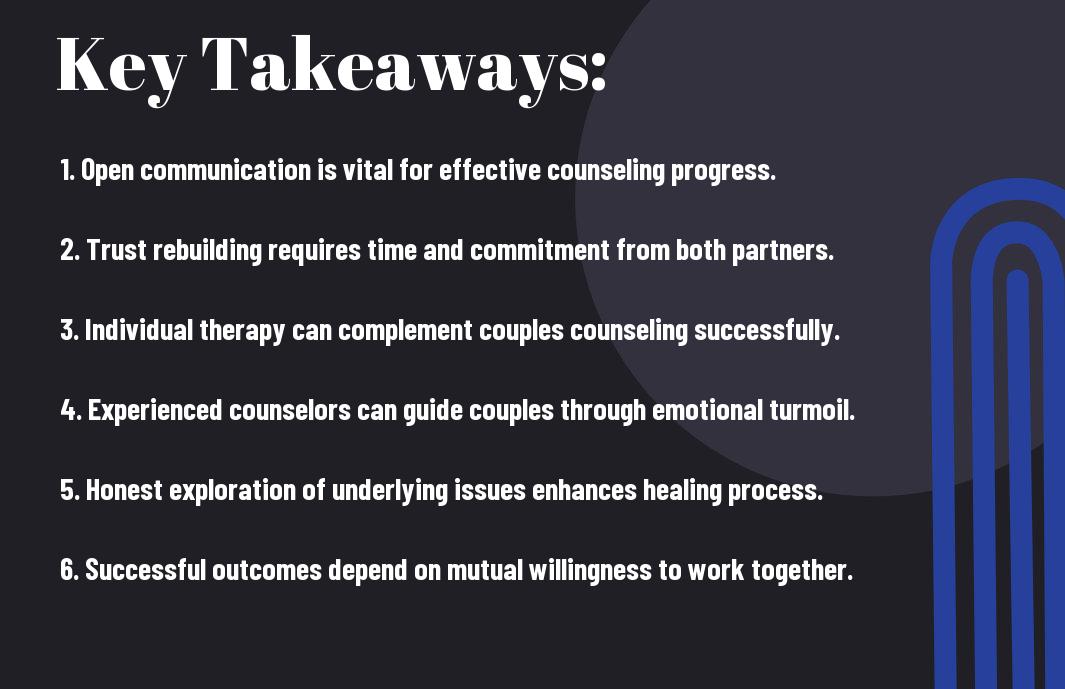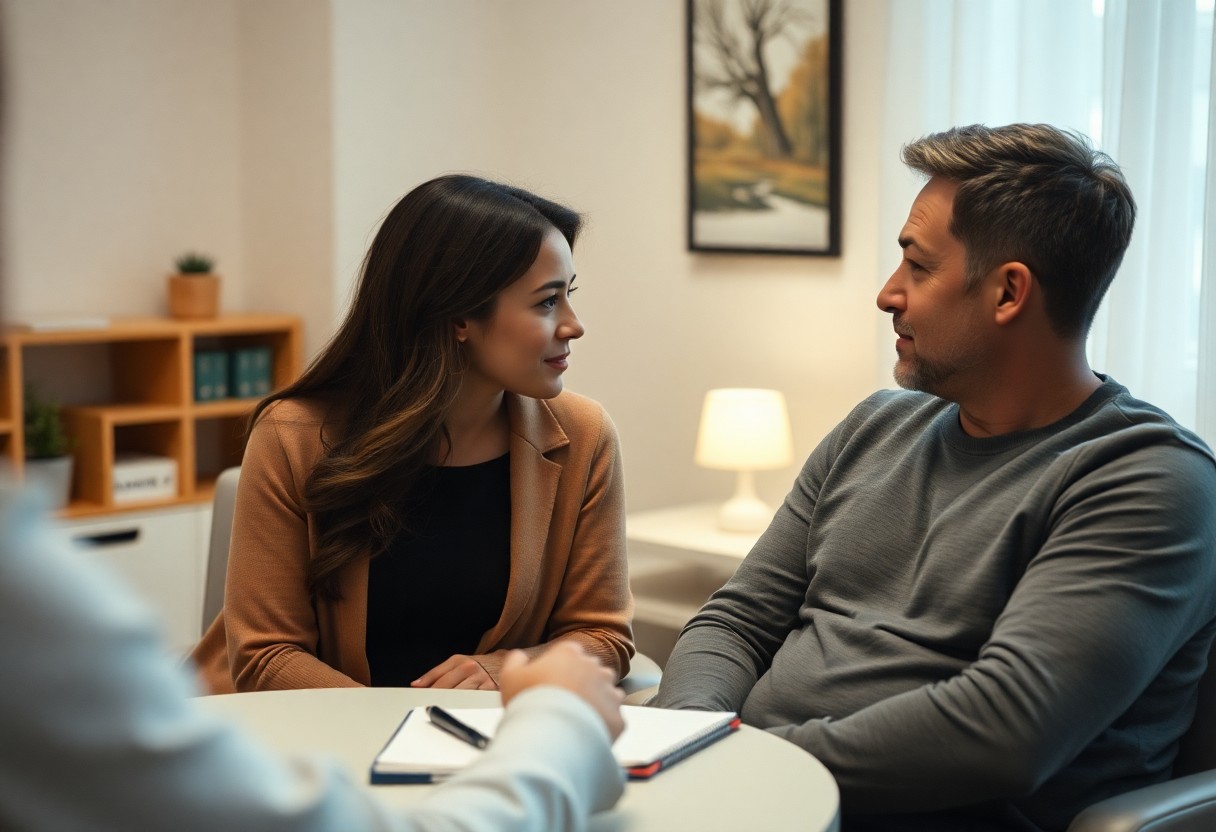Marriage can be one of the most fulfilling experiences in life, yet infidelity can thrust you into a painful crisis that threatens your bond. You may find yourself questioning if marriage counseling is the right step to repair your relationship and heal the wounds of betrayal. Understanding how counseling works and its potential to foster communication and rebuild trust is important. In this post, we will explore the effectiveness of marriage counseling for couples grappling with infidelity and provide insight into whether it truly can lead to a renewed partnership.
Key Takeaways:
- Marriage counseling can provide a safe space for couples to address the emotional fallout of infidelity.
- Success in counseling largely depends on both partners’ willingness to participate and commit to the process.
- Counselors often focus on rebuilding trust, improving communication, and understanding underlying relationship issues.
- The timeline for healing varies; some couples may see progress quickly, while others might take longer to work through their feelings.
- Individual therapy can also be beneficial for partners who need personal support during this time.
- Counseling doesn’t guarantee that a relationship will survive infidelity, but it can provide tools to help navigate the aftermath.
- Timing is important; seeking counseling early in the recovery process can enhance the chances of reconciliation.


Understanding Infidelity
To fully grasp the concept of infidelity, it’s critical to recognize that it extends beyond physical cheating. Infidelity can infiltrate emotional connections, partnerships, and trust, creating a ripple effect that can devastate relationships. Understanding the root causes can aid in addressing this complex issue, providing a path towards healing.
Types of Infidelity
To differentiate the various forms of infidelity, consider the following:
- Emotional Infidelity – Developing an intimate bond with someone outside your relationship.
- Physical Infidelity – Engaging in sexual relationships with someone other than your partner.
- Cyber Infidelity – Involving romantic connections through online platforms.
- Micro-cheating – Small acts of emotional or flirtatious behavior considered disloyal.
- Inadvertent Infidelity – Behaviors that lead to emotional or physical betrayal without intended harm.
Thou must analyze these types to better understand how they impact your partnership.
| Type of Infidelity | Description |
| Emotional Infidelity | Intimacy with someone else |
| Physical Infidelity | Sexual relations outside marriage |
| Cyber Infidelity | Romantic interactions online |
| Micro-cheating | Minor disloyal actions |
| Inadvertent Infidelity | Unintended betrayal behaviors |
Impact on Relationships
With infidelity’s deeply troubling effects, it can lead to severe emotional turmoil for all involved. Trust is often shattered, leading to heightened feelings of insecurity, resentment, and betrayal in relationships. Understanding the emotional landscape is vital to navigate the aftermath effectively.
Indeed, infidelity can create a profound emotional impact on you and your partner. Trust may be broken, leading to feelings of insecurity and betrayal. You might find yourselves in a cycle of anger and sadness, with potential repercussions such as separation or divorce. However, it’s important to recognize that some couples manage to rebuild and foster a stronger connection after infidelity, highlighting the potential for resilience and growth. Understanding the repercussions can help you navigate the path forward.
The Role of Marriage Counseling
The role of marriage counseling in cases of infidelity is to provide a structured environment where you and your partner can address feelings of betrayal, rebuild trust, and establish effective communication. A skilled counselor offers guidance and support, helping to facilitate difficult conversations and promote healing. Through this process, you can work through underlying issues that may have contributed to infidelity, ultimately allowing you to either strengthen your relationship or find a constructive path forward.
What to Expect in Counseling
At marriage counseling, you can expect a safe space to express your emotions openly and honestly. The counselor will guide you through discussions about your relationship, helping both partners articulate their needs and feelings. You may undergo individual sessions alongside couples’ counseling, allowing for a comprehensive exploration of the dynamics at play. You’ll gradually work toward understanding each other’s perspectives and fostering a pathway to recovery.
Techniques Used in Counseling
Against the backdrop of your emotions, various techniques are utilized in marriage counseling to address infidelity. These may include emotionally focused therapy, which promotes bonding and empathy, and cognitive-behavioral therapy, aimed at identifying negative patterns and restructuring thought processes. You may also engage in role-playing exercises to practice communication, alongside guided discussions that focus on rebuilding trust. The ultimate goal is to empower you both to navigate the complexities of your relationship with compassion and clarity.
Techniques employed in marriage counseling are designed to enhance your understanding of each other and improve your relationship dynamics. Emotionally focused therapy can facilitate emotional connection, enabling you to express vulnerabilities without judgment. By utilizing cognitive-behavioral strategies, you can confront harmful thought patterns and replace them with healthier interactions. Additionally, role-playing can help you practice how to communicate effectively in real-life situations, leading to a healthier and more productive dialogue between you and your partner. All these techniques prioritize healing and trust-building, making them imperative to the counseling process.
Success Rates of Marriage Counseling
After facing the aftermath of infidelity, couples often seek marriage counseling to repair their relationship. Understanding the success rates of such counseling can help you gauge the potential for healing and rebuilding trust. Studies reveal that a significant number of couples find success in therapy, with many reporting improved communication and emotional connection. Ultimately, your commitment to the process can greatly influence the outcome.
Statistics and Studies
Across various studies, it has been found that approximately 70-75% of couples report improvement in their relationship after participating in marriage counseling. This suggests that seeking professional help can be a beneficial step in overcoming issues related to infidelity. However, outcomes can vary depending on the couple’s willingness to engage in the process.
Factors Influencing Success
Any number of elements contributes to the success of marriage counseling, including:
- Commitment to the process
- Communication strategies
- Therapist compatibility
- Willingness to address underlying issues
Thou must consider how these factors relate to your unique situation, as they can significantly shape the outcome of your counseling journey.
Even when you pursue marriage counseling, several factors can sway your chances of success. The level of commitment from both partners plays a significant role, as does the ability to engage in open and honest communication. Additionally, the experience and techniques of the therapist can affect your progress in addressing core issues. When both partners are willing to confront past pain and commit to healing, positive outcomes are more likely. Thou should approach this process with an open heart and mind for the best results.
Alternative Approaches to Addressing Infidelity
Many individuals seek alternative approaches to understand and heal from infidelity. While traditional marriage counseling is one method, various other strategies can provide additional support and insight. Exploring these options may enhance your journey toward recovery and growth, whether as a couple or individually.
Individual Therapy
For those dealing with their partner’s infidelity, individual therapy can offer a safe space to process feelings, identify patterns, and cultivate personal growth. Working with a qualified therapist can help you develop coping strategies and build resilience, allowing you to address the emotional turmoil infidelity brings.
Support Groups
Any individual facing the aftermath of infidelity may find solace in support groups. These groups create a sense of community where you can connect with others who share similar experiences, allowing for open discussions and shared healing.
Therapy in a group setting can provide valuable insights from others who have faced similar challenges. Support groups can help you feel less isolated, offering a platform to voice your feelings and fears without judgment. Additionally, hearing about others’ recovery journeys can inspire hope and motivate you to take steps toward healing. Joining such a group can foster connection, normalize your experiences, and offer practical advice as you navigate the complexities of recovery from infidelity.
Common Challenges in Counseling for Infidelity
Unlike traditional relationship issues, counseling for infidelity often encounters unique challenges that can derail the healing process. Both partners may bring a wealth of emotions to the sessions, including anger, sadness, and confusion. Additionally, the couple may struggle with differing perceptions of the affair, creating obstacles in communication. Addressing these challenges openly within the safe confines of counseling can foster understanding, but it requires a strong commitment from both partners.
Trust Issues
Behind every instance of infidelity lies a breach of trust that can leave scars on a relationship. You might find it difficult to reconcile with the fact that your partner has betrayed you, leading to lingering doubts and a pervasive sense of insecurity. In counseling, you will address these trust issues directly, working toward rebuilding the foundation of your relationship through honest communication and accountability.
Emotional Attachments
Attachments formed during the affair can pose significant hurdles in your healing process. If you or your partner developed a deep emotional bond with someone outside the relationship, it complicates the path forward. Counseling can help you better understand these emotional attachments and why they emerged, allowing you to process feelings of jealousy, betrayal, and loss. Recognizing these attachments allows for a more constructive dialogue about the underlying issues in your marriage, fostering an environment where healing can truly begin.
Considering the impact of emotional attachments, it’s imperative to acknowledge their role in your relationship’s dynamics. These attachments can be deeply rooted in unmet needs, which often surface during counseling sessions. Addressing them may reveal underlying issues you’ve faced together, such as communication breakdowns or emotional distance. By identifying and understanding these attachments, you have the potential to transform your relationship, fostering a renewed commitment to each other and paving the way for rebuilding trust and intimacy.

Tips for Choosing a Marriage Counselor
Keep in mind the following tips to help you choose the right marriage counselor for your relationship:
- Look for a counselor with experience in infidelity.
- Check their credentials and qualifications.
- Evaluate their approach to couples therapy.
- Assess compatibility between you and the counselor.
- Seek reviews or referrals for trustworthiness.
Any successful counseling experience hinges on choosing the right therapist. For insights on Infidelity Counseling: How Effective Is It?, explore more.
Qualifications and Experience
Qualifications and experience should be at the forefront of your decision when selecting a marriage counselor. Look for a mental health professional who specializes in marital therapy and has specific training in managing the aftermath of infidelity, ensuring they understand the complexities involved. This expertise will greatly aid in navigating the emotional landscape of your relationship.
Compatibility and Comfort
Around choosing a marriage counselor, your comfort and compatibility with them can significantly affect your therapy’s success. It’s necessary that you feel heard and understood, as this will encourage open communication during sessions. A counselor who resonates with your values and approach can make it easier for you to share sensitive information.
In addition, having a strong rapport with your counselor can create an environment where you feel safe exploring difficult emotions. Trust your instincts—if you feel uneasy or judged, it could hinder your progress. Look for someone who respects your background and experiences, making it easier to confront challenges in your marriage and facilitating a more positive experience during counseling sessions.
Final Words
With this in mind, if you find yourself grappling with the fallout of infidelity in your marriage, consider that marriage counseling can offer the guidance and support you need. While it may not always lead to reconciliation, it can help you and your partner address underlying issues, improve communication, and foster healing. Engaging in professional help allows you to explore your feelings and rebuild trust, whether you choose to stay together or part ways. Overall, the effectiveness of counseling largely depends on your willingness to engage in the process and work towards meaningful change.
FAQ
Q: What is marriage counseling for infidelity?
A: Marriage counseling for infidelity is a therapeutic approach designed to help couples address issues arising from one partner’s unfaithfulness. The goal is to facilitate open communication, rebuild trust, and work through emotional pain while finding ways to move forward, whether that means rebuilding the marriage or parting amicably.
Q: How effective is marriage counseling for couples dealing with infidelity?
A: The effectiveness of marriage counseling for infidelity can vary widely among couples. Research suggests that many couples do report improvements in relationship satisfaction after counseling sessions. Success often depends on the willingness of both partners to engage in the process, communicate openly, and address underlying issues that may have contributed to the infidelity.
Q: What can couples expect during therapy for infidelity?
A: Couples can expect a safe environment to express their feelings and thoughts without judgment during therapy. Counseling may involve exploring the reasons behind the infidelity, discussing its impact on the relationship, and developing strategies to rebuild trust. Couples might also work on enhancing their emotional intimacy and communication skills, which can be beneficial regardless of the outcome of the counseling.
Q: How long does marriage counseling for infidelity typically last?
A: The duration of marriage counseling can vary significantly based on individual circumstances and needs. Some couples may find resolution in just a few sessions, while others may require several months of counseling. It often depends on the complexity of the issues involved and the commitment both partners have to work on the relationship.
Q: Are there specific techniques used in marriage counseling for infidelity?
A: Yes, therapists may employ various techniques such as Emotionally Focused Therapy (EFT), Cognitive Behavioral Therapy (CBT), and even specialized interventions for rebuilding trust. These techniques can help couples understand emotional triggers, improve communication, and explore the underlying dynamics that contributed to the infidelity. The choice of techniques will depend on the therapist’s approach and the preferences of the couple.
